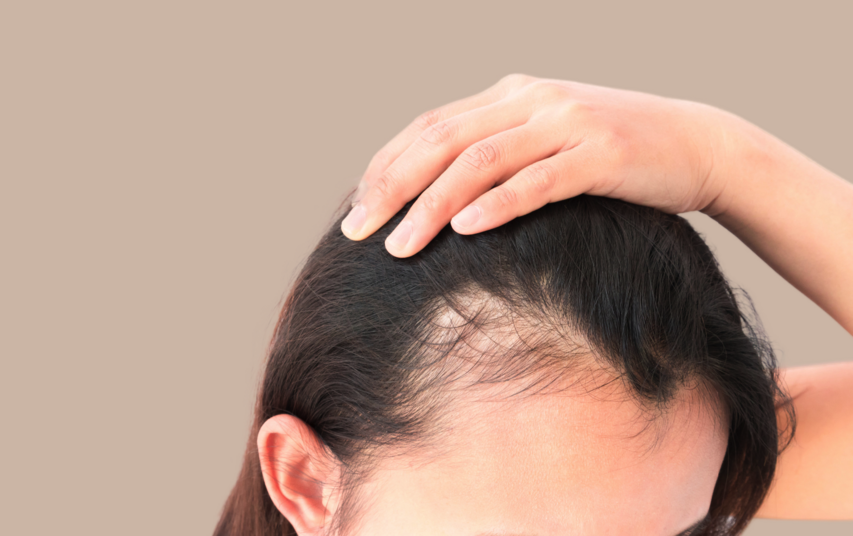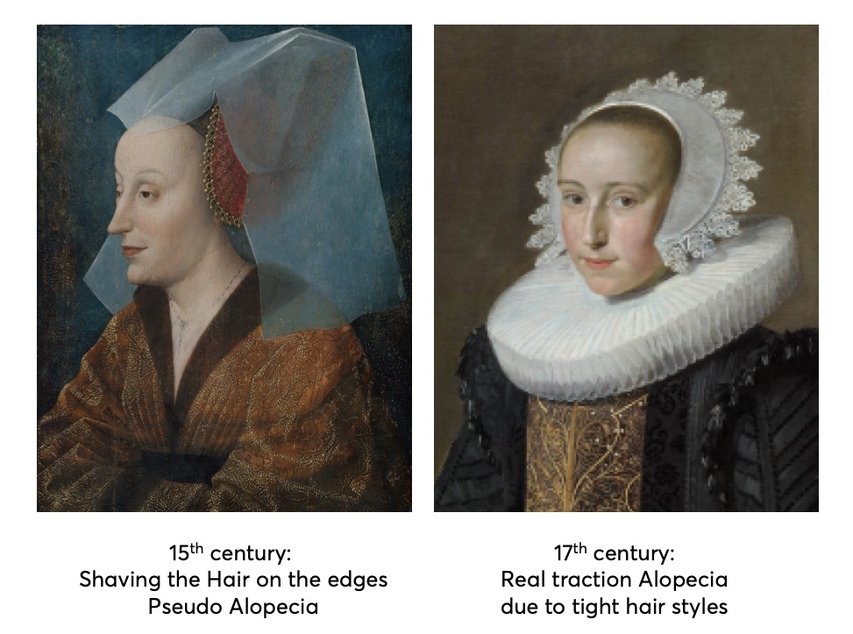Edges hair loss in women - best treatments

Thinning hair around the hairline is one of the most frustrating forms of hair loss for many women since it can be so noticeable. What are the leading causes of this type of hair loss, and what can you do to stop it?
What causes hair loss along the hairline?
Traction alopecia is one of the most common causes of thinning hair around the hairline or edges. This type of hair loss is caused by hair frequently being tightly pulled, which leads to hair follicle inflammation. Ponytails, braids, cornrows, dreadlocks, weaves, hair extensions, wigs, and other tight hairstyles can contribute to traction alopecia. Relaxers and hot tools (like flat irons) can exacerbate the problem. This condition is common in black women (resulting in thinning edges), but it can affect women of any ethnicity.
A group of researchers from China found that young women with ponytail hairstyles would have a two times higher risk of developing a more severe grade of frontal hairline hair loss than those without this hairstyle.
Early signs of traction alopecia include small bumps along the side of the scalp and hairline. Traction alopecia can be reversed – and you can experience hair regrowth in the affected area – if you act quickly enough. However, permanent scarring and damage of the hair follicles are possible if left untreated, so the affected follicles won't produce new hair. We'll talk about treatments and lifestyle changes that can help below.
Other causes of edges and hairline hair loss in women
Traction alopecia is a common cause of hair loss for women of all races, but there are other factors to be aware of. Other causes of hair loss in women include stress, nutritional deficiencies, hormone fluctuations (after childbirth or during menopause), thyroid disorders, and genetic conditions (like female pattern hair loss or alopecia areata).
With all of this in mind, if you're experiencing thinning edges or hair loss around the hairline, you should talk to a dermatologist to get to the root cause. While traction alopecia is a common cause of this type of hair loss, other health issues may contribute to your thinning hairline and general hair loss. Pinpointing the exact issue(s) will help you have the most success stopping hair loss and getting your hair regrowth on track.
Interestingly, in the 15th Century, shaving the hair on the edges of the forehead was fashionable. Dutch paintings from the 17th Century provide us with many examples of natural traction alopecia caused by the tight hairstyle that was in fashion for several decades.

What is Frontal fibrosing alopecia (FFA)?
Frontal fibrosing alopecia (FFA) is a condition characterized by a receding hairline and hair loss at the front of the scalp. It predominantly affects postmenopausal women, though it can also occur in younger women and men. The cause of FFA is not fully understood, but it is believed to involve an autoimmune response that leads to inflammation and scarring of the hair follicles. This scarring prevents new hair growth, leading to permanent hair loss in the affected areas. Symptoms typically include a slowly progressive hairline recession, often accompanied by redness and scaling around the hair follicles. Treatment options to stop further hair loss may include topical or intralesional corticosteroids, anti-inflammatory medications, and immunomodulatory drugs. Early diagnosis and intervention are crucial in managing FFA, as the scarring hair loss is irreversible once it occurs. As a dermatologist specializing in hair care, your expertise would be vital in diagnosing and managing this condition effectively.
How do you stop traction-related hair thinning on the edges and promote regrowth?
Reassess your styling routine.
Stopping (or at least limiting) tight hairstyles and harsh treatments will significantly benefit your hair, especially as you're trying to promote new growth. This is particularly important for those with traction alopecia, but anyone looking to slow down their hair loss can benefit from being gentler on their hair.
In addition to avoiding tight hairstyles, the most effective course of action is to go natural with your hair. This means not using chemical relaxers, hot tools, or dyes, weakening the hair. You want your hair to be as strong as possible, so avoid doing anything that can lead to breakage and make it weaker.
If these steps aren't an option, you can still implement some changes to ensure you're gentler on your hair. Women who wear weaves or extensions may consider giving their hair a break by going natural for the same amount of time they wore them. For example, if you wear a weave for two months, you'll go natural for two months. Additionally, if you're still using what are considered protective styles (such as weaves, braids, and wigs, which are meant to give your hair a break from styling), you also need to ensure you or your stylist is styling them so that minimal tugging is happening. When styled improperly, these protective styles can do more harm than good.
Use a targeted serum.
Topical products containing powerful active ingredients can also help support the scalp and promote regrowth. MDhair's Restore Serum is formulated with various plant-based ingredients known to help prevent hair loss and support growth.
A key ingredient in this serum is rosemary leaf oil, commonly used to stimulate hair growth and support scalp health. It also contains saw palmetto berry extract, which prevents the conversion of testosterone into DHT, and Panax ginseng root, which is believed to help decrease the miniaturization of hair follicles on the scalp (a process that can lead to hair loss). Hydrolyzed rice and oat proteins help with moisture in the hair and scalp, while biotin and vitamin B5 further strengthen and promote growth.
Take supplements
Targeted hair health supplements can help you stop thinning around the hairline and support hair regrowth. MDhair offers a variety of products that can help with hair thinning, including the Regrowth Supplements. These vegan supplements contain a blend of vitamins, minerals, adaptogens, and extracts that support hair health to encourage regrowth, including the following:
- Vitamins B6, B9 (folic acid), D, E, zinc, selenium, and copper: These vitamins and minerals are crucial in maintaining scalp and hair health for maximum regrowth.
- Broccoli powder: Broccoli powder contains B vitamins that reduce stress (which can cause hair loss) and antioxidants that fight free radical damage to the scalp.
- Berry extract: This plant extract prevents the conversion of testosterone into dihydrotestosterone (DHT), an androgen that causes hair follicles to shrink until they cease hair growth. This is particularly beneficial for women dealing with androgenetic alopecia (AKA female pattern hair loss) since these androgens cause it.
- Pygeum bark extract also helps fight DHT by blocking its effects on hair follicles.
- Maitake and reishi mushrooms are potent adaptogens that inhibit an enzyme called 5α-reductase, which is responsible for creating DHT.
Use collagen peptides to boost your skin and hair health.
The strength of our skin and hair depends on their collagen content. This collagen is a peptide made of a long chain of amino acids. Our hair follicles need a continuous supply of amino acids to build new and stronger hair. Recent studies have found that adding collagen peptides can replenish depleted amino acids and help boost natural hair regrowth and healthier skin. Taking collagen peptides is believed to be especially beneficial to heal damaged skin and hair follicles in areas of edges and hairline hair loss. Check this link for more info on collagen supplements and hair regrowth.
Shop:
Best scalp treatment serum for women with "edges" hair loss
Best supplements for women with "edges" hair loss
Best treatment shampoo for women with "edges" hair loss
FAQs:
Q1: What are the leading causes of hair thinning around the hairline in women?
A: Hair thinning around the hairline in women can be caused by traction alopecia, resulting from hairstyles that pull the hair tightly, like ponytails and braids. Other causes include stress, nutritional deficiencies, hormonal changes, thyroid disorders, and genetic conditions like female pattern hair loss or alopecia areata. Early intervention is key to preventing permanent damage.
Q2: How does traction alopecia affect hair health, and is it reversible?
A: Traction alopecia occurs when tight hairstyles cause inflammation of hair follicles, leading to hair loss. Early signs include bumps along the scalp and hairline. It's reversible if addressed early; however, prolonged tension can cause permanent scarring and prevent new hair growth.
Q3: Can changing your hairstyle prevent hairline thinning and promote hair regrowth?
A: Yes, changing your hairstyle can prevent further hair thinning and promote regrowth. Avoiding tight hairstyles, and harsh haircare chemicals and giving your hair a break from weaves or extensions can significantly improve hair health. Gentle styling and natural hair care are crucial for those with traction alopecia.
Q4: What role does nutrition play in preventing hairline hair loss?
A: Nutrition plays a vital role in hair health. Deficiencies in essential vitamins and minerals can lead to hair loss. Supplements like MDhair's Regrowth Supplements, rich in vitamins, minerals, and adaptogens, support hair health and encourage regrowth, which is particularly beneficial for hair thinning around the hairline.
Q5: How can MDhair's Restore Serum aid in combating hairline thinning?
A: MDhair's Restore Serum, formulated with rosemary leaf oil, saw palmetto berry extract, Panax ginseng root, hydrolyzed rice, and oat proteins, biotin, and vitamin B5, helps prevent hair loss and supports growth. These ingredients stimulate hair growth, support scalp health, and strengthen hair.
Q6: Are there any specific supplements recommended for hair regrowth around the hairline?
A: Yes, targeted hair health supplements like MDhair's Regrowth Supplements can be beneficial. They contain a blend of vitamins, minerals, adaptogens, and extracts that support hair health and encourage regrowth, addressing issues like stress and hormonal imbalances that can cause hairline thinning.
Q7: How does stress contribute to hairline thinning, and what can be done about it?
A: Stress can cause hair loss by impacting hormonal balance and nutrient absorption. Managing stress through lifestyle changes, relaxation techniques, and supporting hair health with stress-reducing supplements like those found in broccoli powder and berry extract can help combat hairline thinning.
Q8: What is Frontal Fibrosing Alopecia (FFA), and how does it differ from traction alopecia?
A: Frontal Fibrosing Alopecia (FFA) is an autoimmune condition causing hair loss at the scalp's front. It mainly affects postmenopausal women and involves inflammation and scarring that prevents new hair growth. Unlike traction alopecia, FFA's hair loss is permanent and requires different treatment approaches.
Q9: Can collagen peptides aid in recovering from hairline thinning?
A: Yes, collagen peptides can significantly aid hair regrowth, especially in areas affected by hairline thinning. They replenish amino acids needed for building strong hair and healing damaged skin and hair follicles, supporting overall hair and skin health.
Q10: When should one consult a dermatologist for hairline thinning?
A: Consulting a dermatologist is crucial when you notice signs of hairline thinning, especially if lifestyle changes and over-the-counter treatments don't improve the condition. A dermatologist can pinpoint the underlying causes, such as hormonal imbalances or genetic conditions, and suggest appropriate treatments.
More info on Frontal Fibrosing Alopecia (FFA)
References:
- Traction alopecia: the root of the problem
- Diet and hair loss: effects of nutrient deficiency and supplement use
- The Role of Vitamins and Minerals in Hair Loss: A Review
- A Systemic Review on Topical Marketed Formulations, Natural Products, and Oral Supplements to Prevent Androgenic Alopecia: A Review
Find the most effective hair growth products for you by taking the free hair assessment.



